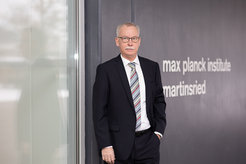F.-Ulrich Hartl receives Breakthrough Prize 2020
The biochemist Hartl and the geneticist Horwich are honored with the world’s highest science prize for their groundbreaking discovery of the protein folding, assistans, chaperones.
F.-Ulrich Hartl, Director at the Max Planck Institute of Biochemistry in Martinsried, is awarded the Breakthrough Prize in Life Sciences 2020 together with Arthur L. Horwich of Yale School of Medicine/HHMI. They are honored for discovering functions of molecular chaperones in mediating protein folding and preventing protein aggregation. If proteins are not folded correctly, they can aggregate – a major cause of nerodegenerative diseases. The prize will be awarded on November 3 in Silicon Valley, USA and is the highest endowed science prize in the world with 3 million US dollars.

Proteins are small molecular machines within each cell and take over a variety of tasks. In order to perform these tasks, newly produced immature chain-like proteins have to fold into a specific, three-dimensional structure. In the 1980s, Hartl and colleagues, in collaboration with Horwich, demonstrated that most of the proteins do not fold spontaneously. Rather, they need assistance in their folding process by so-called molecular chaperones. At the time, this finding contradicted the general dogma. The scientists discovered that certain chaperones are cage-like ‘folding machines’. They offer a protected environment to newly produced proteins, allowing them to fold into their correct functional structure.
Misfolded proteins clump together to form toxic aggregates and are one of the main causes of severe neurodegenerative disorders such as Alzheimer’s disease or Parkinson’s disease. Furthermore, protein misfolding plays an essential role in aging. The findings on chaperone functions make a significant contribution to the development of new therapeutic strategies. [FA]
About F.-Ulrich Hartl
F.-Ulrich Hartl was born in 1957. He studied Medicine at the University of Heidelberg, where he also obtained his doctoral degree. Hartl joined Walter Neupert’s research group at LMU as a postdoc and then became a group leader in Neupert’s department. A fellowship from the German Research Foundation (DFG) enabled him to undertake research at the University of California, Los Angeles. He did research as a Professor and Howard Hughes Medical Investigator at the Sloan Kettering Institute and Cornell University in New York, USA. In 1997, the Max Planck Society succeeded in enticing the renowned scientist back to Germany. Since then, he has been Director and head of the Department of Cellular Biochemistry at the Max Planck Institute of Biochemistry. Within the last years he was honored with multiple scientific prizes including 2002 the Gottfried Wilhelm Leibniz Prize, 2011 the Albert Lasker Award for Basic Medical Research, 2012 the Shaw Prize together with Horwich and 2016 the Albany Medical Center-Prize together with Horwich and Susan Lee Lindquist. In 2018, Hartl was inducted into the Hall of Fame of German Research, in 2019 he received the Dr. Paul Janssen Award and the Paul Ehrlich- and Ludwig Darmstaedter-Prize.
[FA]
About the Breakthrough Prize in Life Sciences
Since 2012, the Breakthrough Prize, sponsored by Sergey Brin (Google), Priscilla Chan and Mark Zuckerberg (Facebook) among others, has been known as the world's richest science prize, honoring the latest advances in physics, mathematics and basic life sciences. It tributes outstanding scientists and their groundbreaking discoveries which contribute significantly to the progress of research. The Breakthrough Prize in the category Life Sciences honors transformative advances toward understanding living systems and extending human life, with one prize dedicated to work that contributes to the understanding of neurological diseases. The awards, each worth 3,000,000 US dollars will be presented at the gala ceremony on November 3 in Silicon Valley, USA. https://breakthroughprize.org/
About the Max Planck Institute of Biochemistry
The Max Planck Institute of Biochemistry (MPIB) belongs to the Max Planck Society, an independent, non-profit research organization dedicated to top level basic research. As one of the largest Institutes of the Max Planck Society, 850 employees from 45 nations work here in the field of life sciences. In currently eight departments and about 25 research groups, the scientists contribute to the newest findings in the areas of biochemistry, cell biology, structural biology, biophysics and molecular science. The MPIB in Munich-Martinsried is part of the local life-science-campus where two Max Planck Institutes, a Helmholtz Center, the Gene-Center, several bio-medical faculties of two Munich universities and several biotech-companies are located in close proximity.
http://www.biochem.mpg.de
